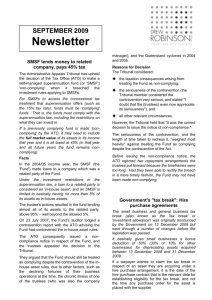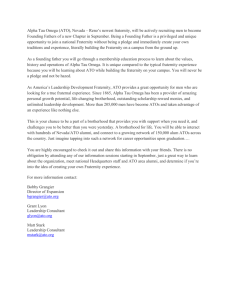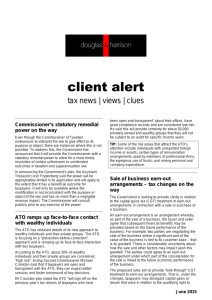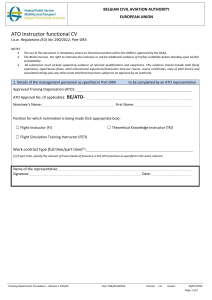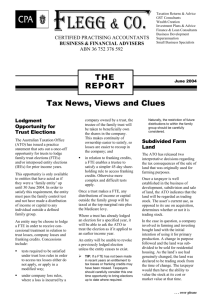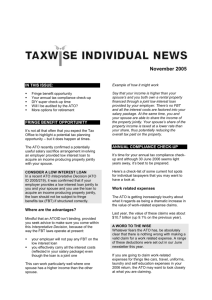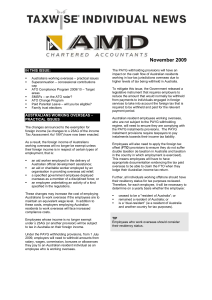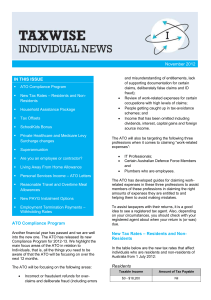1st July Medicare Levy 2% Deficit Levy SGC Superannuation
advertisement
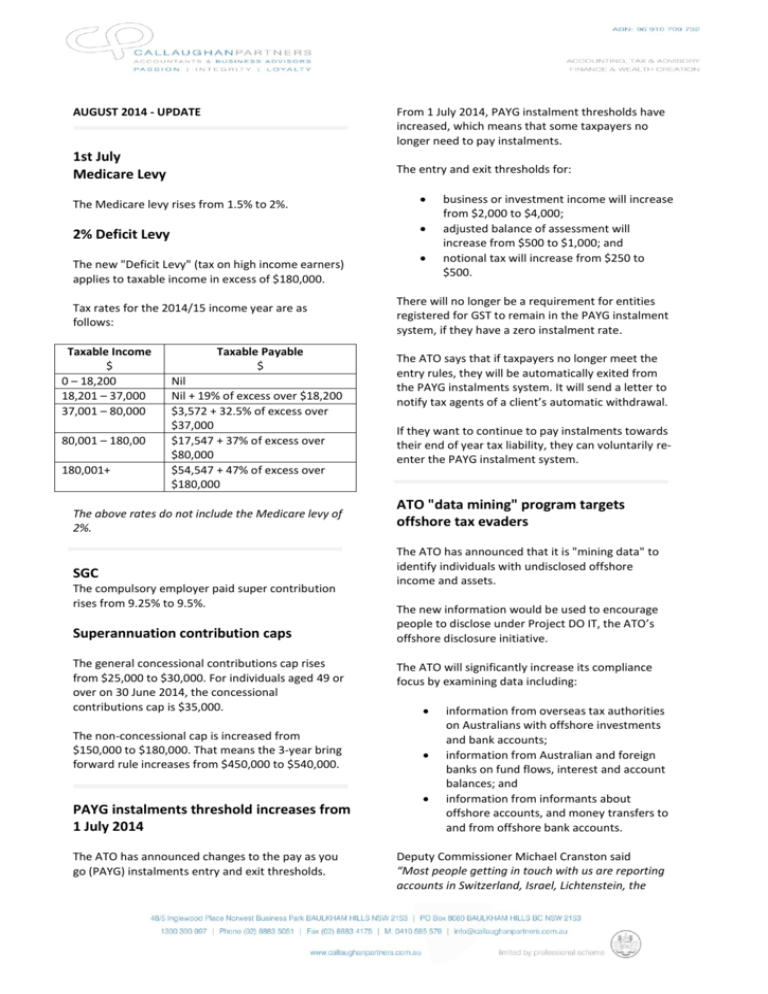
AUGUST 2014 - UPDATE From 1 July 2014, PAYG instalment thresholds have increased, which means that some taxpayers no longer need to pay instalments. 1st July Medicare Levy The entry and exit thresholds for: The Medicare levy rises from 1.5% to 2%. 2% Deficit Levy The new "Deficit Levy" (tax on high income earners) applies to taxable income in excess of $180,000. Tax rates for the 2014/15 income year are as follows: Taxable Income $ 0 – 18,200 18,201 – 37,000 37,001 – 80,000 80,001 – 180,00 180,001+ Taxable Payable $ Nil Nil + 19% of excess over $18,200 $3,572 + 32.5% of excess over $37,000 $17,547 + 37% of excess over $80,000 $54,547 + 47% of excess over $180,000 The above rates do not include the Medicare levy of 2%. SGC The compulsory employer paid super contribution rises from 9.25% to 9.5%. Superannuation contribution caps The general concessional contributions cap rises from $25,000 to $30,000. For individuals aged 49 or over on 30 June 2014, the concessional contributions cap is $35,000. The non-concessional cap is increased from $150,000 to $180,000. That means the 3-year bring forward rule increases from $450,000 to $540,000. PAYG instalments threshold increases from 1 July 2014 The ATO has announced changes to the pay as you go (PAYG) instalments entry and exit thresholds. business or investment income will increase from $2,000 to $4,000; adjusted balance of assessment will increase from $500 to $1,000; and notional tax will increase from $250 to $500. There will no longer be a requirement for entities registered for GST to remain in the PAYG instalment system, if they have a zero instalment rate. The ATO says that if taxpayers no longer meet the entry rules, they will be automatically exited from the PAYG instalments system. It will send a letter to notify tax agents of a client’s automatic withdrawal. If they want to continue to pay instalments towards their end of year tax liability, they can voluntarily reenter the PAYG instalment system. ATO "data mining" program targets offshore tax evaders The ATO has announced that it is "mining data" to identify individuals with undisclosed offshore income and assets. The new information would be used to encourage people to disclose under Project DO IT, the ATO’s offshore disclosure initiative. The ATO will significantly increase its compliance focus by examining data including: information from overseas tax authorities on Australians with offshore investments and bank accounts; information from Australian and foreign banks on fund flows, interest and account balances; and information from informants about offshore accounts, and money transfers to and from offshore bank accounts. Deputy Commissioner Michael Cranston said “Most people getting in touch with us are reporting accounts in Switzerland, Israel, Lichtenstein, the AUGUST 2014 - UPDATE Netherlands, South Africa and Hong Kong, so we’ll obviously be looking closely at flow of funds to those countries." Now phone scammers target taxpayers with threats Taxpayers are being warned to be on the lookout for a malicious scam that attempts to intimidate them into paying a fake tax debt over the phone. “This scam is particularly concerning because it threatens taxpayers with legal action or arrest if they do not immediately hand over money, and their personal financial details, over the phone,” said ATO Chief Technology Officer, Todd Heather. If people receive a call from the ATO and are concerned about providing their personal information over the phone, they should ask for the caller’s name and phone them back through the ATO’s switchboard on 13 28 69. SMSFs and overseas seminars The ATO says that it is keeping an eye on promoters who advertise questionable SMSF conferences in overseas destinations. The promotions target SMSF trustees citing they can claim a deduction for the full cost of the travel, accommodation and meals component incurred when attending these seminars or workshops. The conferences appear to contain minimal training related to SMSF activities and the ATO is likely to target any such expenses claimed by SMSFs. Get a second (investment) opinion The ATO is encouraging anyone unsure about a tax investment they have been offered to seek a second opinion from an independent and trusted tax professional, so as not to be fooled by legitimate looking tax avoidance schemes. Deputy Commissioner Tim Dyce says illegal schemes are usually designed to appear legitimate, even to experienced investors, but there are telltale signs you can look out for. In particular, he advises people to watch out for unusual financing arrangements such as round-robin financing and non-recourse loans. In one case, promoters offered a ‘mortgage management plan’ promising to assist investors in repaying their home loan sooner. The scheme involved using the equity in their home to get additional loans to claim investment deductions equivalent to home loan interest payments. Be wary of promoters that: offer zero-risk guarantees for their product; refer you to a particular adviser or expert. They may seek to persuade you by claiming the adviser has specific knowledge about the arrangement and the promised tax benefits; and ask you to maintain secrecy to protect the arrangement from rival firms and discourage you from obtaining independent advice. Small business online dispute resolution service The Minister for Small Business has announced that small businesses in a dispute are set to benefit from the launch of Dispute Support, a new online dispute resolution information and referral tool. "Small businesses have told us it can be difficult to find alternative dispute resolution services and to work out which one is most suited to their needs." Dispute Support is a simple to use online tool to help small businesses identify the most appropriate low cost dispute resolution service for their dispute. It also provides information on understanding and managing disputes, and tips to help avoid disputes in the future. It is available on the Australian Small Business Commissioner’s website.
